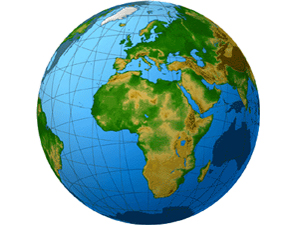'Well-behaved' African leaders rewarded by President Obama
By Jehron Muhammad | Last updated: May 10, 2013 - 1:08:07 PMWhat's your opinion on this article?

|
In March “well-behaved African heads of state ... (were) rewarded by Barack Obama with a chance to meet with him in groups of four and have their picture taken with him,” reported Africasacountry.com. “It’s like meeting Beyonce, but you get to call it a state visit.”
And what made matters worse is that they just sat there with folded hands like American subjects, beaming as the president read their accomplishments. “The wider symbolism was unmistakable,” wrote Elliot Ross, “These guys, Obama is saying, work for me. African visitors (unlike other heads of state) can be received in groups, as, they’re all Africans, don’t need to be spoken to individually. Politics? Negotiations? They’re just happy to be here.”

“The essence of neo-colonialism is that the state which is subject to it is, in theory, independent and has all the outward trappings of international sovereignty. In reality, its economic system and thus its political policy is directed from outside.” —Osagyefo Kwame Nkrumah, |
The president said during the photo-op that the presidents of Senegal, Malawi, Sierra Leone and the prime minister from Cape Verde “exemplify the progress that we’re seeing in Africa.”
Secretary of State John Kerry revealed in April that President Obama is going to Africa. The Obama administration’s position on Africa might be a reaction to this year’s OAU/AU 50th Anniversary celebration, or better yet China’s increasingly large African footprint. No clear Africa policy has emerged during Obama’s second term.
Kerry recently let it be known that in May he plans on attending this year’s AU Summit in Addis Ababa. He also said, without giving details, that Obama also plans to go to Africa.
What is revealing is four months into Kerry’s tenure the State Department, especially its Africa Bureau, appears to still be trying to find its legs.
A large number of senior State Department positions remain vacant, including the Obama administration’s top envoy to Africa post. Ambassador Johnny Carson, assistant secretary of state for African Affairs, retired in March. The post is currently being run by Acting Assistant Secretary Don Yamamoto, a Foreign Service officer. National Security Counsel Senior Director Gayle Smith is rumored to be in the running for the top Africa post. In addition other Africa posts, including the special envoy for Sudan, remain vacant.
ForeignPolicy.com believes Obama and his team “are determined to control it all.” He’s obviously not going to give Kerry the same controls over the State Department that he succumbed to giving Hillary Clinton. “The Cable” blog, which appears on ForeignPolicy.com, included a piece titled “Nobody home at the State Department,” which suggests the “process to fill (senior State Dept. positions) seems indefinitely stalled.”
Whatever this means it doesn’t bode well for developing a cohesive African policy. In March Obama excluded Nigeria, one of Africa’s most influential nation states—also the continent’s most populous—from attending the White House summit. The slight was Obama’s way of registering his displeasure over the recent pardon granted embattled former Bayelsa State Governor D.S.P. Alamieyeseigha.
This was done in face of the fact that, not only does Section 175 of Nigeria’s constitution allow a presidential pardon, but the Council of State advised the president “to grant him (a pardon).” Alamieyeseigha was convicted of stealing and laundering public funds. Not only did he return the stolen funds, according to the Nigerian Vanguard, he also “pleaded guilty and served out his eight year (prison) term.”
Obama’s slight to Nigeria and African leaders falling over themselves for a White House invitation speaks to a divided Africa and to an Africa unwilling or unable to police its own affairs.
Nation of Islam leader Minister Louis Farrakhan addressing 19 African heads of state at the 1993 African African-American Summit in Gabon stated, “We don’t think like free men.” “We go to the capitals of America and Europe, like paupers, (too) weak to demand or ask for what unjust regimes will never give,” he said.
Nkrumah, in his seminal work “Neo-colonialism the last stage of imperialism,” explained how so-called independent states are controlled by outside powers. “The essence of neo-colonialism is that the state which is subject to it is, in theory, independent and has all the outward trappings of international sovereignty. In reality, its economic system and thus its political policy is directed from outside.”
Unless Africa develops its potential power through a unified continent, as advocated by Nkrumah, and gains control of its natural resources, Min. Farrakhan warned, “We will never achieve what we desire for our people … We have the pomp and circumstances of real power, but beneath it there is no real substance.”
Jehron Muhammad, who writes from Philadelphia, can be reached at [email protected].
INSIDE STORIES AND REVIEWS
-
-
About Harriett ... and the Negro Hollywood Road Show
By Rabiah Muhammad, Guest Columnist » Full Story -
Skepticism greets Jay-Z, NFL talk of inspiring change
By Bryan 18X Crawford and Richard B. Muhammad The Final Call Newspaper @TheFinalCall » Full Story -
The painful problem of Black girls and suicide
By Charlene Muhammad -National Correspondent- » Full Story -
Exploitation of Innocence - Report: Perceptions, policies hurting Black girls
By Charlene Muhammad -National Correspondent- » Full Story -
Big Ballin: Big ideas fuel a father’s Big Baller Brand and brash business sense
By Bryan Crawford -Contributing Writer- » Full Story






 Click Here Stay Connected!
Click Here Stay Connected!








